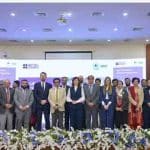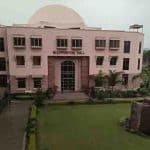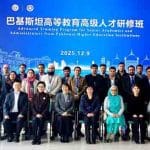FAISALABAD, Jul 26 (APP):Lt. Gen. (Rtd.) Muhammad Asghar, Member, China Pakistan Economic Corridor (CPEC) Higher Education Commission Islamabad visited University of Agriculture Faisalabad (UAF) and held meeting with UAF Vice Chancellor Prof. Dr. Iqrar Ahmad Khan in his chamber.
Matters relating to CPEC, agricultural development, yield enhancement and possibilities of cooperation in the field of agriculture under CPEC came under discussion.
During visit of exhibition staged at Expo Center of the university, Dr. Iqrar Ahmad Khan highlighted the latest R&D activities of the varsity and emphasized that immediate attention to be given to the application of technology for forecasting and decision support systems.
He said that UAF had made a collaborative effort of completing agro ecological zoning that enabled the government to declare 14 agro-ecological zones in the province.
The new zoning could help the farmers to rethink traditional crop choices and invite policy organs to relocate and facilitate the relevant industries in the region, he added.
He said that data sciences, artificial intelligence and communication technologies offered precision applications to combat weather challenges, so traditional and generalized cropping schemes like wheat/cotton or wheat/rice need to be replaced with a diversity of crop choices.
Talking about the potential of soybean, he said that UAF had 130 soybean trials in place from Badin to Astore, ready for harvesting in the months of June/July and genetic collection coupled with agronomic research show that different varieties are suited to different locations/times of the year.
He said that soybean experiments offered a wide range of data to devise a Climate Smart Agriculture platform.
Responding to a question, he said that wheat yields remained stagnant for several years due to temperature spikes/terminal heat causing poor grain filling that was reversed during the last harvest because of favorable weather.
He underscored the need of introduction of heat tolerant varieties thereby breaking the wheat yield stagnation and arresting the $10 billion import of essential commodities.
By doing this only, he anticipated, ‘we would reduce the area under wheat and allow the expansion of cultivated area under early cotton, oilseeds, pulses, and soybean’.
In addition to yield and disease resistance, it is important to breed wheat for nutritional value (protein, zinc/ iron fortified wheat), he added.
Lt. Gen. (Rtd.) Muhammad Asghar appreciated the UAF achievements and anticipated that work started at UAF would yield sweet fruits and bring robust change in the socioeconomic development of the country.
Follow the PNI Facebook page for the latest news and updates.








